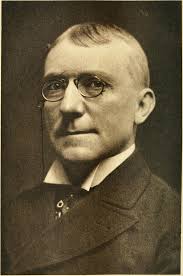Armazindy Page #13
James Whitcomb Riley poems book published in the 1894 book Armazindy and received very negative reviews that referred to poems like "The Little Dog-Woggy" and "Jargon-Jingle" as "drivel" and to Riley as a "worn out genius". Most of his growing number of critics suggested that he ignored the quality of the poems for the sake of making money.
EROS The storm of love has burst at last Full on me: All the world, before, Was like an alien, unknown shore Along whose verge I laughing passed.— But now—I laugh not any more,— Bowed with a silence vast in weight As that which falls on one who stands For the first time on ocean sands, Seeing and feeling all the great Awe of the waves as they wash the lands And billow and wallow and undulate. ORLIE WILDE A goddess, with a siren’s grace,— A sun-haired girl on a craggy place Above a bay where fish-boats lay Drifting about like birds of prey. Wrought was she of a painter’s dream,— Wise only as are artists wise, My artist-friend, Rolf Herschkelhiem, With deep sad eyes of oversize, And face of melancholy guise. I pressed him that he tell to me This masterpiece’s history. He turned—returned—and thus beguiled Me with the tale of Orlie Wilde:— “We artists live ideally: We breed our firmest facts of air; We make our own reality— We dream a thing and it is so. The fairest scenes we ever see Are mirages of memory; The sweetest thoughts we ever know We plagiarize from Long Ago: And as the girl on canvas there Is marvellously rare and fair, ’Tis only inasmuch as she Is dumb and may not speak to me!” He tapped me with his mahlstick—then The picture,—and went on again: “Orlie Wilde, the fisher’s child— I see her yet, as fair and mild As ever nursling summer day Dreamed on the bosom of the bay: For I was twenty then, and went Alone and long-haired—all content With promises of sounding name And fantasies of future fame, And thoughts that now my mind discards As editor a fledgling bard’s. “At evening once I chanced to go, With pencil and portfolio, Adown the street of silver sand That winds beneath this craggy land, To make a sketch of some old scurf Of driftage, nosing through the surf A splintered mast, with knarl and strand Of rigging-rope and tattered threads Of flag and streamer and of sail That fluttered idly in the gale Or whipped themselves to sadder shreds. The while I wrought, half listlessly, On my dismantled subject, came A sea-bird, settling on the same With plaintive moan, as though that he Had lost his mate upon the sea; And—with my melancholy trend— It brought dim dreams half understood— It wrought upon my morbid mood,— I thought of my own voyagings That had no end—that have no end.— And, like the sea-bird, I made moan That I was loveless and alone. And when at last with weary wings It went upon its wanderings, With upturned face I watched its flight Until this picture met my sight: A goddess, with a siren’s grace,— A sun-haired girl on a craggy place Above a bay where fish-boats lay Drifting about like birds of prey. “In airy poise she, gazing, stood A matchless form of womanhood, That brought a thought that if for me Such eyes had sought across the sea, I could have swum the widest tide That ever mariner defied, And, at the shore, could on have gone To that high crag she stood upon, To there entreat and say, ‘My Sweet, Behold thy servant at thy feet.’ And to my soul I said: ‘Above, There stands the idol of thy love!’ “In this rapt, awed, ecstatic state I gazed—till lo! I was aware A fisherman had joined her there— A weary man, with halting gait, Who toiled beneath a basket’s weight: Her father, as I guessed, for she Had run to meet him gleefully And ta’en his burden to herself, That perched upon her shoulder’s shelf So lightly that she, tripping, neared A jutting crag and disappeared; But left the echo of a song That thrills me yet, and will as long As I have being!... ... “Evenings came And went,—but each the same—the same: She watched above, and even so I stood there watching from below; Till, grown so bold at last, I sung,— (What matter now the theme thereof!)— It brought an answer from her tongue— Faint as the murmur of a dove, Yet all the more the song of love.... “I turned and looked upon the bay, With palm to forehead—eyes a-blur In the sea’s smile—meant but for her!— I saw the fish-boats far away In misty distance, lightly drawn In chalk-dots on the horizon— Looked back at her, long, wistfully,— And, pushing off an empty skiff, I beckoned her to quit the cliff And yield me her rare company Upon a little pleasure-cruise.— She stood, as loathful to refuse, To muse for full a moment’s time,— Then answered back in pantomime ‘She feared some danger from the sea Were she discovered thus with me.’ I motioned then to ask her if I might not join her on the cliff; And back again, with graceful wave Of lifted arm, she answer gave ‘She feared some danger from the sea.’ “Impatient, piqued, impetuous, I Sprang in the boat, and flung ‘Good-bye’ From pouted mouth with angry hand, And madly pulled away from land With lusty stroke, despite that she Held out her hands entreatingly: And when far out, with covert eye I shoreward glanced, I saw her fly In reckless haste adown the crag, Her hair a-flutter like a flag Of gold that danced across the strand In little mists of silver sand. All curious I, pausing, tried To fancy what it all implied,— When suddenly I found my feet Were wet; and, underneath the seat On which I sat, I heard the sound Of gurgling waters, and I found The boat aleak alarmingly.... I turned and looked upon the sea, Whose every wave seemed mocking me; I saw the fishers’ sails once more— In dimmer distance than before; I saw the sea-bird wheeling by, With foolish wish that I could fly: I thought of firm earth, home and friends— I thought of everything that tends To drive a man to frenzy and To wholly lose his own command; I thought of all my waywardness— Thought of a mother’s deep distress; Of youthful follies yet unpurged— Sins, as the seas, about me surged— Thought of the printer’s ready pen To-morrow drowning me again;— A million things without a name— I thought of everything but—Fame.... “A memory yet is in my mind, So keenly clear and sharp-defined, I picture every phase and line Of life and death, and neither mine,— While some fair seraph, golden-haired, Bends over me,—with white arms bared, That strongly plait themselves about My drowning weight and lift me out— With joy too great for words to state Or tongue to dare articulate! “And this seraphic ocean-child And heroine was Orlie Wilde: And thus it was I came to hear Her voice’s music in my ear— Ay, thus it was Fate paved the way That I walk desolate to-day!” ... The artist paused and bowed his face Within his palms a little space, While reverently on his form I bent my gaze and marked a storm That shook his frame as wrathfully As some typhoon of agony,
Translation
Translate and read this book in other languages:
Select another language:
- - Select -
- 简体中文 (Chinese - Simplified)
- 繁體中文 (Chinese - Traditional)
- Español (Spanish)
- Esperanto (Esperanto)
- 日本語 (Japanese)
- Português (Portuguese)
- Deutsch (German)
- العربية (Arabic)
- Français (French)
- Русский (Russian)
- ಕನ್ನಡ (Kannada)
- 한국어 (Korean)
- עברית (Hebrew)
- Gaeilge (Irish)
- Українська (Ukrainian)
- اردو (Urdu)
- Magyar (Hungarian)
- मानक हिन्दी (Hindi)
- Indonesia (Indonesian)
- Italiano (Italian)
- தமிழ் (Tamil)
- Türkçe (Turkish)
- తెలుగు (Telugu)
- ภาษาไทย (Thai)
- Tiếng Việt (Vietnamese)
- Čeština (Czech)
- Polski (Polish)
- Bahasa Indonesia (Indonesian)
- Românește (Romanian)
- Nederlands (Dutch)
- Ελληνικά (Greek)
- Latinum (Latin)
- Svenska (Swedish)
- Dansk (Danish)
- Suomi (Finnish)
- فارسی (Persian)
- ייִדיש (Yiddish)
- հայերեն (Armenian)
- Norsk (Norwegian)
- English (English)
Citation
Use the citation below to add this book to your bibliography:
Style:MLAChicagoAPA
"Armazindy Books." Literature.com. STANDS4 LLC, 2025. Web. 10 Jan. 2025. <https://www.literature.com/book/armazindy_946>.




Discuss this Armazindy book with the community:
Report Comment
We're doing our best to make sure our content is useful, accurate and safe.
If by any chance you spot an inappropriate comment while navigating through our website please use this form to let us know, and we'll take care of it shortly.
Attachment
You need to be logged in to favorite.
Log In